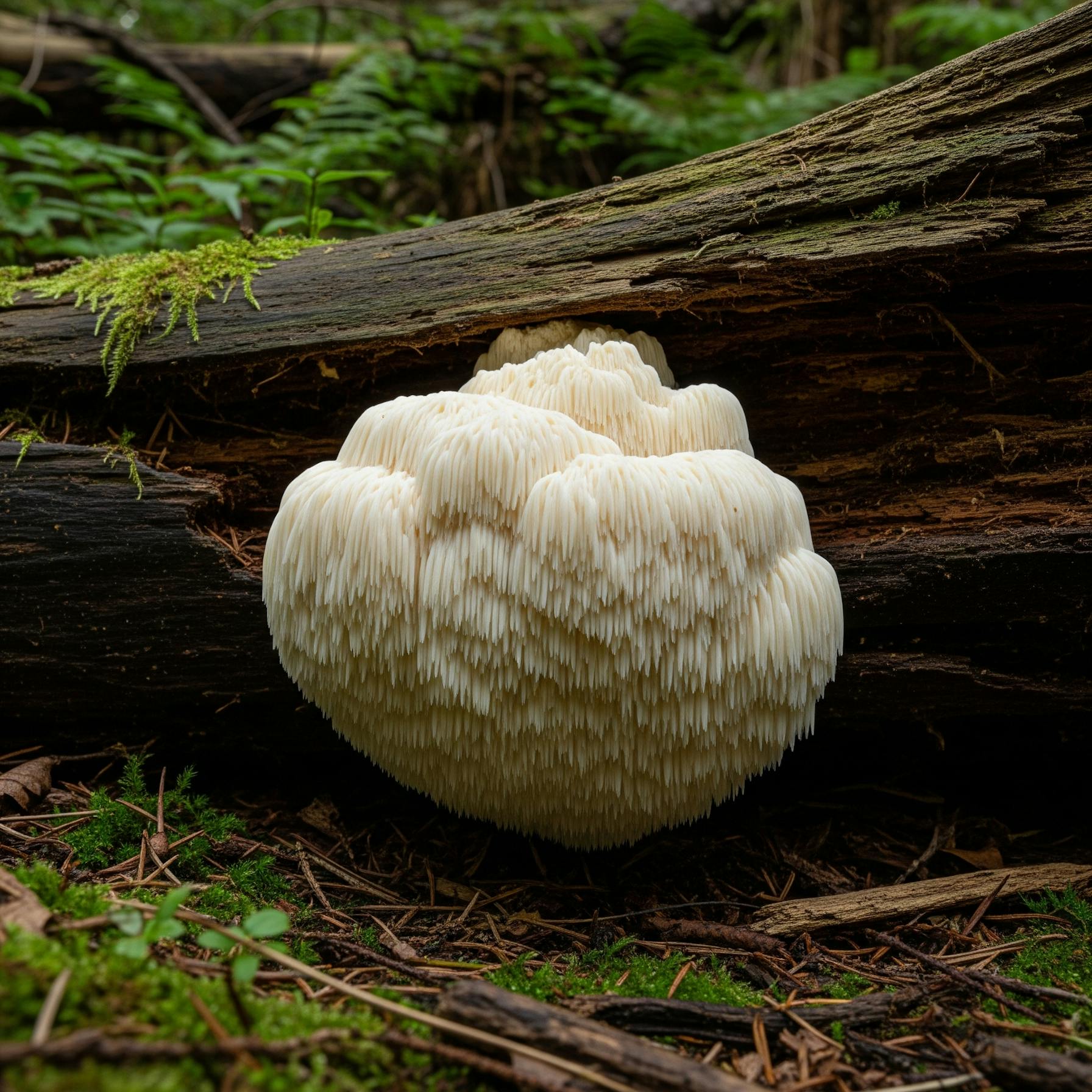
 Broderick Adams
Broderick AdamsMeet the Mushroom: Lion's Mane Mushrooms
Welcome to our next installment of "Meet the Mushroom," where we spotlight the fascinating fungi we grow here at Emory Market Gardens. Today, we're excited to introduce you to the remarkable and distinctive Lion's Mane Mushroom!
What Are Lion's Mane Mushrooms?
Lion's Mane Mushrooms (Hericium erinaceus) are unlike any other mushroom you'll encounter. Instead of the traditional cap and stem structure, these unique fungi grow in cascading white tendrils that resemble a lion's mane - hence their evocative name. Also known as Hedgehog Mushroom, Bearded Tooth Fungus, or Yamabushitake in Japan, these snowball-like wonders have captured the attention of both chefs and medical researchers alike.
Native Habitat
In the wild, Lion's Mane Mushrooms are woodland treasures. They're typically found growing on hardwood trees, particularly American beech, maple, oak, and birch. Native to North America, Europe, and Asia, these fascinating fungi emerge from wounds or dead areas of living trees, as well as logs and stumps of deceased trees.
What makes Lion's Mane special is not just their appearance but their relatively rare occurrence in nature. As old-growth forests diminish, wild Lion's Mane has become increasingly uncommon, making cultivation efforts like ours all the more important for preserving access to this extraordinary mushroom.
How to Identify Lion's Mane Mushrooms
Proper identification is crucial when foraging for mushrooms. Here's how to recognize Lion's Mane Mushrooms:
- Shape: Distinctive globular or heart-shaped body covered with cascading white "teeth" or spines, resembling a pom-pom or waterfall of icicles.
- Size: Typically 4-10 inches (10-25 cm) in diameter but can grow larger under ideal conditions.
- Color: Pure white when young, developing yellowish or tan hues as they mature.
- Spines: Soft, downward-pointing teeth that are 1-4 cm long.
- Texture: Fleshy and moist when fresh.
- Smell: Subtle seafood-like aroma.
- Spore Print: White.
- Habitat: Always found growing on hardwood, never from soil.
- Look-alikes: Other Hericium species such as H. americanum (Bear's Head Tooth) and H. coralloides (Coral Tooth) look similar but have more branching structures. Fortunately, all Hericium species are edible and have similar properties.
Ideal Growing Conditions
Here at Emory Market Gardens, we create the perfect environment for our Lion's Mane:
- Temperature: Lion's Mane prefers cooler temperatures between 65-75°F (18-24°C) for optimal fruiting.
- Humidity: High humidity (85-90%) is essential during all growth stages.
- Light: Indirect light helps trigger proper development and the formation of the characteristic "teeth."
- Substrate: We use a hardwood sawdust substrate supplemented with bran to mimic their natural growing medium.
- Air Exchange: Fresh air is important, but Lion's Mane is more forgiving of CO2 levels than some other varieties.
Lion's Mane requires patience - they typically take 14-21 days to colonize their substrate and another 4-7 days to form their distinctive fruiting bodies. The wait is well worth it for these exceptional mushrooms.
Culinary Excellence
Lion's Mane Mushrooms offer a unique culinary experience:
- Flavor Profile: They have a delicate, sweet, seafood-like flavor often compared to crab or lobster.
- Texture: When cooked, Lion's Mane develops a meaty, tender texture with a slight chew that many compare to seafood.
- Versatility: These mushrooms excel in recipes that would typically call for seafood - think crab cakes, seafood pasta, or chowders. They also stand alone beautifully when simply sautéed.
- Nutritional Value: Rich in protein, dietary fiber, and immune-supporting beta-glucans, Lion's Mane also contains a remarkable array of bioactive compounds being studied for their neurological benefits.
Cooking Tips from Our Farm Kitchen
To bring out the best in our Lion's Mane Mushrooms:
- Slice into steaks or tear into bite-sized pieces before cooking
- Sauté with high heat until the edges turn golden brown and crispy
- A little butter, garlic, and sea salt is all you need to highlight their delicate flavor
- Try them as a plant-based alternative in "crab" cakes or "lobster" rolls
- Avoid excessive moisture when cooking - a dry pan helps develop their unique texture
Beyond the Kitchen: Medicinal Marvel
What truly sets Lion's Mane apart from other culinary mushrooms is its impressive array of potential health benefits. Traditional Eastern medicine has valued this mushroom for centuries, and modern science is catching up with fascinating research:
- Cognitive Support: Lion's Mane contains compounds called erinacines and hericenones that may stimulate nerve growth factor (NGF) production, supporting brain health and neural regeneration.
- Mood Enhancement: Several studies suggest Lion's Mane may help reduce symptoms of anxiety and depression.
- Digestive Health: Traditional uses for stomach ailments are being validated by research showing anti-inflammatory effects in the digestive tract.
- Immune Support: Like many medicinal mushrooms, Lion's Mane contains beta-glucans that may help modulate immune function.
At Emory Market Gardens, we celebrate both the culinary delight and wellness potential of these remarkable fungi.
Sustainability Champions
Lion's Mane represents sustainable food production at its finest. Their ability to transform hardwood waste into nutrient-dense food makes them ecological heroes. Additionally, their unique medicinal properties offer the possibility of addressing health concerns through food rather than synthetic pharmaceuticals.
At Emory Market Gardens, we're proud to cultivate these woodland treasures as part of our commitment to sustainable, health-promoting local food.
What's Next in "Meet the Mushroom"?
We'd love to hear from you! What mushroom variety would you like to learn about in our next installment? Are you curious about the vibrant Pink Oyster, the meaty King Trumpet, or perhaps the coveted Shiitake? Let us know here.
Facebook: facebook.com/emorymarketgardens
Instagram: instagram.com/emorymarketgardens
Share your mushroom interests and questions with us here, and don't forget to check out our fresh Lion's Mane Mushrooms at the market this weekend!